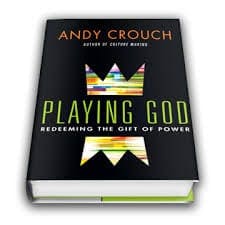I know! There are too many good things to read…you can’t read everything that crosses your radar! But when I read something that is really exceptional, I just have to share it with others. And, since I write a weekly blog, those others get to be you.
Playing God, by Andy Crouch, is just such a book. Crouch is an accomplished concert pianist, married to a brilliant physicist, and is the executive editor of Christianity Today: in short, one of those guys who got his own talent, and about three other people’s, as well. I had the chance to meet him the other day, and in addition to being terribly brainy, he’s also terribly kind and approachable.
Crouch makes the acute point that we’ve all heard lots of sermons on healthy and unhealthy uses of money and sex, but very few teachings on the redemptive use of power. As a result, we tend to think of it as either something to condemn, a gateway to brutality and violence, or something from which Christians should simply shy away because, as Lord Acton says, “absolute power corrupts absolutely”.
Unfortunately, this is a very non-redemptive perspective on power. God created power; He is power. Like all things that are of God and given by Him, it is inherently good. It is fallen man and a fallen world that corrupts it and uses it for evil purposes. So, how do we distinguish between the two, and how do we use power as image-bearers of God for redemptive purposes?
Crouch points out that we all think that absolute power corrupts absolutely, but that isn’t necessarily true. There’s been a time in your life when you had absolute power over someone and you weren’t corrupted in that: over your children when they were babies. In fact, it was the complete opposite. It was fierce, protective, nurturing, empowering love, sacrificial to the core, dedicated to see those little lives under your absolute power over them thrive and flourish. Absolute power calls for deeper sacrifice when it’s transformed by love.
Contrary to being coercive or brutal, redemptive power, motivated by love and a desire to see those around us thrive is relational, it is creative, it seeks to create more power by empowering others. Image bearers seek to reflect the image of God to transform the world from its goodness to the “very goodness” that happens when an image bearing agent acts upon the creation.
Image bearers transform creation from the good that God created to very good, transforming nature to culture. As Crouch points out, grain is good, but bread is very good. Eggs are good, but an omelet or soufflé is very good. Grapes are good, but wine (or grape juice, depending on your denominational affiliation!) is very good; it “gladdens the heart of man.” The world was waiting for us to arrive, to unfold its potential. No other creature does this, only the image bearers of God. God has given us the power to do that.
Redemptive power is for flourishing, when we empty out ourselves in love and express the gifts that God has given us, fully bearing His image.
Power can obviously and apparently be corrupted. It happens when we try to make something like money, sex, digital technology, relationship, or any good, created thing that is not God our god, looking to it to give us dignity, value, identity, and worth. When it fails to deliver on that promise, as it always ultimately will, we use violence and coercion to try to make it deliver what it promised before, and doesn’t deliver now. We see that all the time in our celebrity-driven culture, with folks who are addicted to fame and whose flower is fading doing more and more extreme things to gain the publicity that they once had, and still crave.
Power is also corrupted when it comes in the form of injustice, or using one’s power sinfully to deprive another of theirs. Crouch makes the point that systemic, generational poverty is a lack of connections, of people deprived of access to others and to institutions that can help them escape from the conditions they are in. Any use of one’s authority to render others more vulnerable, to remove their ability to flourish is injustice, and God hears the prayers of those so wounded.
So, here’s the takeaway: how well do you use the power God has given you as His image-bearer? In your home, in your church, as a leader in your workplace, of your team, of your family? Do you use your power to empower others, to make them stronger, better at what they do, to become more responsible, thriving, flourishing image-bearers themselves? Or, do people wilt around you? Are you a source of injustice? Do you deprive people of the ability to flourish? As leaders and parents and teachers and ministers of the gospel, we will all be called to give an account of how we use this very precious gift of power that God has given us. I pray we’ll steward it well.

Well said! Knowing that power did not always corrupt, Lord Acton qualified his statement: “Power tends to corrupt, and absolute power corrupts absolutely. Great men are almost always bad men.” Yes, Christians must use the power God has given them for good… any vacuums in the realms of power will be filled by someone. Several years ago I found myself reading an autobiography of a corporate leader. I was pretty down on the corporate world at the beginning, but by the end, I was thinking, “What an opportunity for Christians to be of influence.” Sounds like a timely book, Jay!